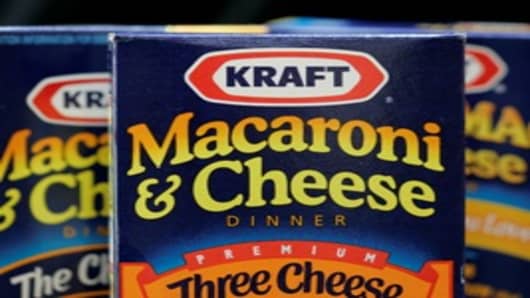Dow component Kraft Foods beat profit estimates in the second quarter, raised its guidance and announced it will split in two. Two of the company's largest shareholders — Nelson Peltz and Warren Buffett — later endorsed the split.
Kraft's profit per share was 62 cents compared with 58 cents forecast by analysts while net revenue was up 13.3 percent to $13.9 billion from $13.15 billion expected by analysts surveyed by Reuters.
The company also raised guidance for operating earnings per share to at least $2.25 for this year from at least $2.20.
"We've raised our 2011 guidance to reflect our strong operating results and favorable currency through the first half," David Brearton, executive vice president and chief financial officer, said in a statement.
"Despite rising input costs and a volatile economic environment, aggressive cost management coupled with strong revenue growth gives us confidence that we will deliver top-tier performance for the year," Brearton added.
Kraft also said it would split into two separate listed companies: the global snacks business and the North American grocery business.
The company said it would do this by spinning off its North American grocery business to its shareholders. It aims to complete the process by the end of 2012.
The grocery business — with annual revenue of about $16 billion — would include its U.S. beverages, cheese and convenient meals with brands including Maxwell House coffee and Jell-O desserts.
The company would also include non-snack categories in Canada and its food service business.
The high-growth snacks company, with annual sales of $32 billion and brands such as Oreo cookies and Cadbury, would include its Europe and developing markets units and its North American snacks and confectionery businesses.
The move earned high marks from investor Nelson Peltz, who owns over 12 million Kraft shares worth about $381.9 million as of June 27, according to his Trian company's most recent 13-F filing.
He told CNBC Thursday during Kraft's conference call that he is "very supportive of management and board for coming to this decision. They made two great decisions, one required the other. The decision to buy Cadbury set the table for them to come to this conclusion."
He said it is in the "best interest of shareholders to create a unique consumer products business with very high-growth prospects, huge emerging-market exposure and one that separates itself from the slow-growth commodity-related meat and cheese business."
Investors, Peltz said, "now have a choice between investing in this business, which will be a low dividend payer, and the North American food business that will probably be a high dividend payer. Investors can take advantage of both companies."
Separately, Warren Buffett, whose Berkshire Hathway owns about 6 percent of Kraft stock as of March 31, told CNBC he was "fine with" the split. Buffett, who opposed Kraft's purchase of Cadbury, said he saw nothing negative about the split after hearing about it from Kraft CEO Irene Rosenfeld when she visited him in Omaha on Tuesday.
Kraft is the latest consumer goods company to separate its units in order to focus them better and offer shareholders distinct investment opportunities.
Fortune Brands , which also reported earnings on Thursday, and Sara Lee are also spinning off units.
A year and a half after buying Britain's Cadbury, Kraft said its snack business and North American grocery business now "differ in their future strategic priorities, growth profiles and operational focus."
The company's shares jumped more than 7 percent before the bell. They closed at $34.30 on Wednesday.
- Get after-hour quotes for Kraft here.


